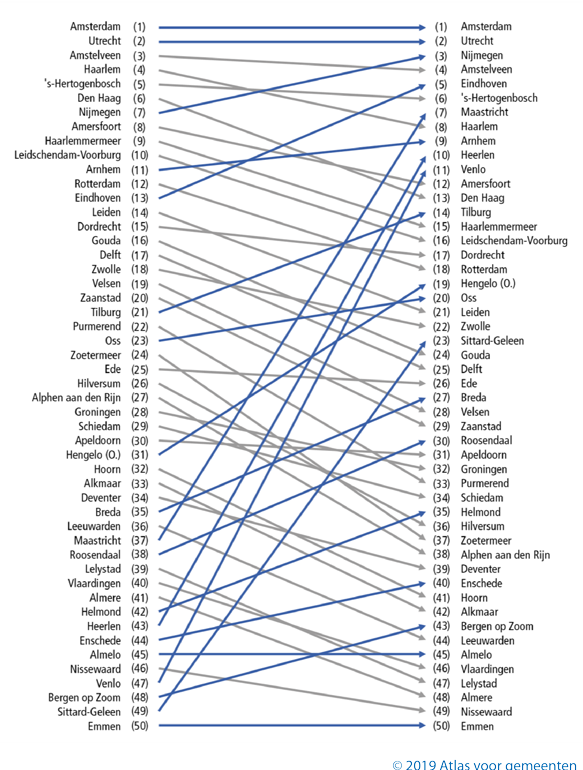South Limburg: borders inhibit the region
In the context of De Atlas voor Gemeenten 2019 , it became clear that South Limburg has potential. Not just any potential, but even has the ability to grow into "a top region with one of the largest (eu) regional economies in the Netherlands". This is a passage from the recently published Zuid-Limburg cooperation agenda . Last Friday ITEM PhD student Stefan Bemelmans was interviewed by RTV Maastricht about possible border barriers that could prevent South Limburg from growing.
An important conclusion that emerged from the report was that border regions benefit greatly from a borderless Europe. South Limburg, as a border region with the most border areas, stood out strongly in this respect: Municipalities such as Maastricht (37 =>7), Heerlen (43 =>10) and Sittard-Geleen (49 =>23) are currently ranked low on the list of most attractive cities. However, if the problems arising from the borders with Belgium and Germany were to be solved, the aforementioned cities would suddenly become one of the most attractive cities (see figure below).
Border Barriers
PhD student Stefan Bemelmans, who is attached to the ITEM Expertise Centre of Maastricht University and to the Law, Tax & Business Unit of Hasselt University, was interviewed by RTV Maastricht last Friday 24 May. Mr. Bemelmans' PhD research concerns the cross-border pension administration of foreign nationals. According to PhD student Mr. Bemelmans, who is also a mobile employee himself, there are several reasons, related to border barriers, that can be put forward for the conclusion of the Atlas for Municipalities 2019.
These border barriers are mainly caused by the fact that a mobile employee in cross-border situations has to take into account at least two different legal systems that often do not fit together. For example, there is no harmonised European pension legislation. In such cases, the mobile worker may be confronted with a variety of complex questions. For mobile workers, it is often unclear who is responsible for what and how all kinds of issues should be dealt with. In addition, it is not always clear what the social security and tax position of the mobile employee is.
In addition, different pensionable ages may be considered. As a result, the mobile employee is confronted with different starting dates for his or her pension. This means that the moment at which the mobile employee in question can retire is determined by the Member State with the highest retirement age. In addition, there is a lack of flexibility with regard to the state pension age.
The different ways of pension accrual and the resulting loss of accrued pension can also be a border barrier for mobile workers in certain situations. Mr. Bemelmans also spoke about this last point during the interview with RTV Maastricht on Friday 24 May .
Interview Stefan Bemelmans (video)
Finally, differences in qualifications can also lead to border barriers. For example, Country A may qualify certain income as income from employment while Country B may qualify the same income as pension income. There is also no European tax legislation with regard to tax legislation. With regard to taxation, this may result in the mobile employee being confronted with double taxation.
Solution: Cooperation
Since it is unlikely that the existing borders will disappear in the short term, cooperation is very important. Many partnerships have already been concluded in recent years. Earlier this month, the ITEM Expertise Centre of Maastricht University and the Law, Tax & Business Unit of Hasselt University signed a collaborative covenant with the aim of getting researchers from both universities to work together to draw attention to and, if possible, solve bottlenecks for the mobile employee. In the meantime, several border consultancy offices have already been established in and around South Limburg, including the grensinformatiepunten (GIPs) in Kerkrade/Herzogenrath, Aachen and Maastricht . The GIPs are service providers that provide free advice to mobile workers and/or employers on questions about living, working and studying in the Netherlands, Belgium or Germany. That South Limburg has the potential to become a top region remains undisputed, but how much time is still needed for this, that is the big question..

Additional information Atlas for Municipalities:
The Atlas for Municipalities is a report that is published annually and compares 50 municipalities in the Netherlands on 50 different areas. These areas are subdivided into five research themes: residential climate & attractiveness, quality of life & safety, art & culture, happiness & well-being, economy & labour market. Such a report is of great importance to municipalities in order to be able to respond to socio-economic population developments that are currently taking place.
For more information, read the article 'Zonder grenzen is Zuid-Limburg een topregio' ' van ESZL (Economische Samenwerking Zuid-Limburg) (only available in Dutch).
ITEM annually publishes cross-border impact assessment which measures and analyses the border effects of current policies and themes. The ITEM Cross-border Portal provides you with up-to-date information on the relevant topics and research relating to border regions and cross-border cooperation.
Also read
-
Shuo Li guest researcher at IGIR
Dr. Shuo Li will visit IGIR for one year, between October 2025 and October 2026. Her current research focuses on China and international arbitration.

-
Globalisation & Law Network seminar with Giuseppe Martinico
On 23 October 2025, the Globalisation & Law Network, together with the Maastricht Centre for Law & Jurisprudence, organised a seminar featuring Giuseppe Martinico (Sant'Anna School of Advanced Studies, Pisa).

-
Overriding Mandatory Rules in International Commercial Arbitration, a Comparative Study between France, Switzerland, England and Egypt
PhD thesis by Ibrahim Shehata
